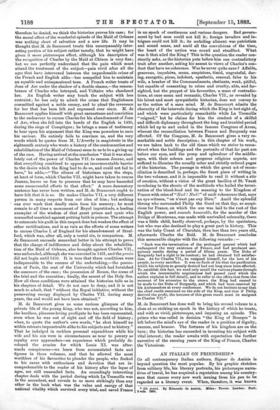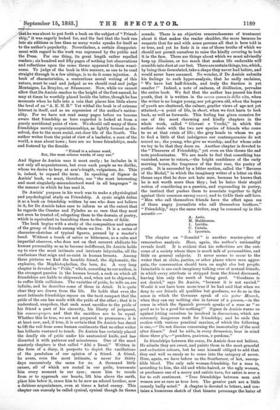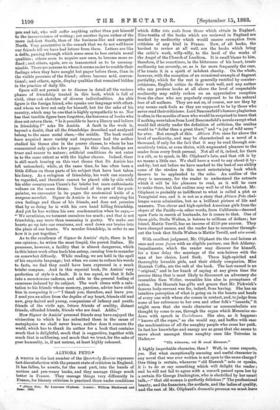AN ITALIAN ON FRIENDSHIP.* Or all contemporary Italian authors, Signor
de Amicis is beyond question the most popular. By his graphic sketches from military life, his literary portraits, his picturesque narra- tives of travel, he has acquired. a reputation among his country- men that causes every new work issuing from his pen to be regarded as a literary event. When, therefore, it was known
• Gli Amid.. By Edmonds de Andel& Men: Treves. London: Nutt. 8 vols. 7888.
that he was about to put forth a book on the subject of " Friend-
,/ ship " it was eagerly looked for, and the fact that the book ran into • nto ins editions in leas than as many weeks speaks for itself as to the author's popularity. Nevertheless, a certain disappoint- ment with regard to the work was expressed by the public and the Press. For one thing, its great length rather repelled readers ; six hundred and fifty pages of nothing but observations and reflections upon the same theme appeared to them weari- some. To judge of the book in this manner, as one to be read straight through in a few sittings, is to do it some injustice. A book of characteristics, a sententious moral writing of this nature, must be read and judged as we should read and judge Montaigne, La Bruyere, or Senancour. Now, while we cannot allow that De Amicis reaches to the height of the first-named, he may at times be worthily placed beside the latter, though he has moments when he falls into a vein that places him little above the level of an "A. K. H. B." Yet withal the book is of extreme interest in itself, and as an expression of the author's nation- ality. For we have not read many pages before we become aware that friendship as here regarded is looked at from a purely meridional point of view. We should call many of these friendships merely acquaintanceships, as lightly formed as dis- solved, due to the more social, outdoor life of the South. The author writes from the point of view of a bachelor, a man of the world, a man about town ; here are no home friendships, made and fostered by the fireside.
"Friend is a solemn word,
But, like most solemn words, of easy use."
And Signor de Amicis uses it most easily ; he includes in it not only all acquaintances, but even such people as we dislike, whom we desire to keep at arm's-length, vulgarians, &c. This is, indeed, to expand the term. In speaking of Signor de Amicis' book, we must, therefore, use "the most interesting and most singularly-misunderstood word in all languages " in the manner in which he has used it.
De Amicis' purpose in his work was to make a physiological and psychological study on Friendship. A cynic might define it as a book on friendship written by one who does not believe in it, for De Amicis takes care to inform us at the outset that he regards the Orestes and Pylades as so rare that they need not even be treated of, relegating them to the domain of poetry, which is equivalent to banishing them to the realm of fable.
- The book begins with a study of the composition and nature of the group of friends among whom we live. It is a series of character-sketches of typical figures, penned by a master's hand. Without a touch of satire or bitterness, as a calm and impartial observer, who does not on that account abdicate his human personality so as to become indifferent, De Amicis holds np to view the most intimate and intricate labyrinths, all the confusions that reign and co-exist in human breasts. Among these pictures we find the humble friend, the diplomatic, the explosive, the Mephibtophelian, the bore, &c. A very long chapter is devoted to "Pride," which, according to our author, is the strongest passion in the human breast, a rock on which all friendships are liable to shipwreck, and, when not to shipwreck, to suffer little collisions. The varieties of pride, be tells us, are infinite, and he describes some of these in detail. It is quite clear they are drawn from the life. He holds that even the most intimate friendships repose on the tacit compact that the pride of the one has made with the pride of the other ; that it is understood, unspoken, that each must sacrifice to the pride of his friend a part of his sincerity, his liberty of judgment, his amour-propre, and that the sacrifices are to be equal. Whether this be true, we are not prepared to pronounce; it is at least new, and, if true, it is certain that De Amicis has dared to lift the veil from some human sentiments that no other writer has hitherto ventured to touch. De Amicis has certainly placed the deadly sin of pride under his anatomical knife, and has dissected it with patience and minuteness. One of the most masterly chapters is that called " Alti e Bassi." Written in the form of a diary, it purports to depict the vacillations of the pendulum of our opinion of a friend. A friend, he avers, even the most intimate, is never for thirty days successively the same for us. A thousand little causes, all of which are rooted in our pride, transmute him every moment in our eyes ; cause him to recede from or to approach our hearts, lift him above the earth, place him below it, cause him to be now an adored brother, now a dubious acquaintance, even at times a hated enemy. This chapter can scarcely be called cynical, cynical though its theme
sounds. There is an objective remorselessness of treatment about it that makes the reader shudder, the more because he suspects that for and with some persons all that is here told is so true, and yet he feels it is one of those truths of which we should not permit ourselves to raise the kindly covering to look it in the face. There are things about which we must advisedly keep up illusions, or too much that makes life endurable will crumble into dust at our feet. There are certain things, too, wl2ialt, by being thus formulated, take a shape they never had before, and would never have assumed. No wonder, if De Amicis submits his feelings to such hyper-analysis, that he sadly exclaims, " We have but half-friends, and truly the fraction is yet
smaller !" Indeed, a note of sadness, of disillusion, pervades the entire book. We feel that the author has passed his first youth, that it is written in the mezzo cammin della vita, when the writer is no longer young, nor yet grown old, when the hopes of youth are shattered, the calmer, gentler views of age not yet attained,—a point of life, in short, when we first learn to look back, as well as forwards. This feeling has given occasion for one of the most charming and kindly chapters in the whole work, called " Giovani a Vecchi," in which the author deals with the two new species of friends who come to us at that crisis of life ; the grey heads to whom we go to find a little of that indulgence our contemporaries do not accord us ; the young, who give us worship, and for whose sake
we try to be that they deem us. Another chapter is devoted to the " Pleasures of Friendship," yet even on this theme the sad note predominates. We are made to feel that something has vanished, never to return,—the bright confidence of the early morning hours, the fragrance of the first rose, the poetry of youth. It is succeeded by a bitter section, called the " Reverse of the Medal," in which the imaginary writer of a letter on this theme says that he does not hate men, because he knows that he is not worth more than they ; but he hates their stupid notion of considering as a passion, and expounding in poetry, the instinct that pushes them to associate together to fight against their common enemy ennui, and to tickle their self-love. "Men who call themselves friends have the effect upon me of those angry journalists who call themselves brothers." " Friendship," says the same writer, may be summed up in this acrostic :—
A. Astio.
M. Maldicenza.
I. Invidia.
C. Cabala.
I. Ipocrisia.
The chapter on " Scandal " is another master-piece of
remorseless analysis. Here, again, the author's nationality reveals itself. It is evident that his reflections are the out- come of a society where there is much talk of personalities, and little on general subjects. It never seems to occur to the writer that at clubs, parties, or other places where men aggre-
gate, the conversation should turn on aught else but people. Inimitable is one such imaginary talking over of mutual friends, in which every attribute is stripped from the friend discussed, leaving him only the merit of being good. " Goodness is not denied," says De Amicis, " because it is not envied." Would it not have been more true if be had said that when we deny to our friends all qualities but goodness, we do so in the sense in which the Germans speak of emu guter Mensch,, when they can say nothing else in favour of a person,---in the sense in which the Spanish proverb speaks of a man as " so good as to be a good for-nothing?" Signor de Amicis warns us against letting ourselves be involved in discussions, which are extremely dangerous reefs for friendship; and he ends this section with various practical maxims, of which the following is one,—" Do not discuss concerning the immortality of the soul after dinner." And he adds, in every dieusesion, bear in mind these three p's,—" pondera, pazienza, e perdona."
In friendships between the sexes, De Amicis does not believe. He admits they are sweet, and paints them in the most graceful and seductive colours, but he sees himself obliged to add that they end well so rarely as to come into the category of never.
Here, again, we have before us the Southerner, of hot, suscep- tible blood. The only safe woman-friendship for a man is, according to him, the old and white-haired, or the ugly woman, or perchance one of a merry and satiric turn, for satire is ever a foe to soft sentiment "True friendships between men and women are as rare as true love. 'Ihe greater part are a little comedy badly acted." A chapter is devoted to letters, and con- tains a humorous sketch of that bizarre personage the hater of
pen and ink, who will suffer anything rather than put himself to the inconvenience of writing; yet another figure rather of the more indolent South, than of the business-like and energetic North. Very penetrative is the remark that we do not well know our friends till we have had letters from them. Letters are like a defile, passing through which some seem to lose certain moral qualities ; others seem to acquire new ones, to become more re- fined ; and others, again, are so transmuted as to be unrecog- nisable. There are persons to whom it seems easier to confide their feelings when they have nought but paper before them, than in the visible presence of the friend ; others become arid, conven- tional ; and others, again, display qualities that remained hidden in the practice of daily life.
Space will not permit us to discuss in detail all the various phases of friendship treated in this book, which is full of vivid, clear-cut sketches of diverse individualities. An able figure is the foreign friend, who speaks our language with effort, and whom we love not only for himself, but for the sake of his country, which may be one that is highly sympathetic to us. Nor has that terrible figure been forgotten, the borrower of books who does not return them. " Is it possible to have a library and believe in friendship P" asks De Amicis. A fault in the work is, beyond a doubt, that all the friendships described and analysed belong to the same social class,—the middle. The book would have acquired more variety and importance had the author studied his theme also in the poorer classes, to whom he has consecrated only quite a few pages. In this class, feelings are truer and nearer to nature ; artificial conditions do not enter in to the same extent as with the higher classes. Indeed, there is still much bearing on this vast theme that De Amicis has left untouched ; while, at the same time, he has often been a little diffuse on those parts of his subject that have best taken his fancy. As a eulogium of friendship, his work can scarcely be regarded, and therefore cannot be placed side by side with his elder countryman Cicero's far briefer but more enthusiastic volume on the same theme. Instead of the pen of the poet- painter, we encounter in its pages the anatomical knife of a surgeon-novelist. Signor de Amicis is for ever analysing his own feelings and those of his friends, and does not perceive that by so doing he is with his own hand killing friendship.
And yet he has written his own condemnation when he says,- " We scrutinise, we torment ourselves too much ; and that is not
friendship, any more than reasoning is poetry. We make our hearts go up into our craniums, and send down our brains into the place of our hearts. We murder friendship, in order to see how it is put together."
As to the excellence of Signor de Amicis' style, there is but one opinion ; he writes the most limpid, the purest Italian. He possesses, however, a facility that is almost dangerous, which in this latest work often leads him astray, causing him to meander on somewhat diffusely. While reading, we are held in the spell of his exquisite language ; but when we come to reduce his words to facts, we find they could have been expressed in a much briefer compass. And in this especial book, De Amicis' very perfection of style is a fault. It is too equal, so that it falls into a monotonous cadence, and adds to the general feeling of sameness induced by its subject. The work closes with a salu- tation to his friends whose memory, passions, advice have aided him in composing it:—" I thank you, therefore, and leave you. I send you an adieu from the depths of my heart, friends old and new, grey-haired and young, companions of infancy and youth, friends of the virile ago, future friends of senility, distant friends, offended friends, friends who are dead. Addio."
How Signor de Amicis' personal friends may have enjoyed the vivisection to which he has submitted them in the cause of metaphysics we shall never know, neither does it concern the world, which has to thank its author for a book that contains much that is delightful, much that is suggestive, together with much that is saddening, and much that we trust, for the sake of poor humanity, is, if not untrue, at least highly coloured.




































 Previous page
Previous page